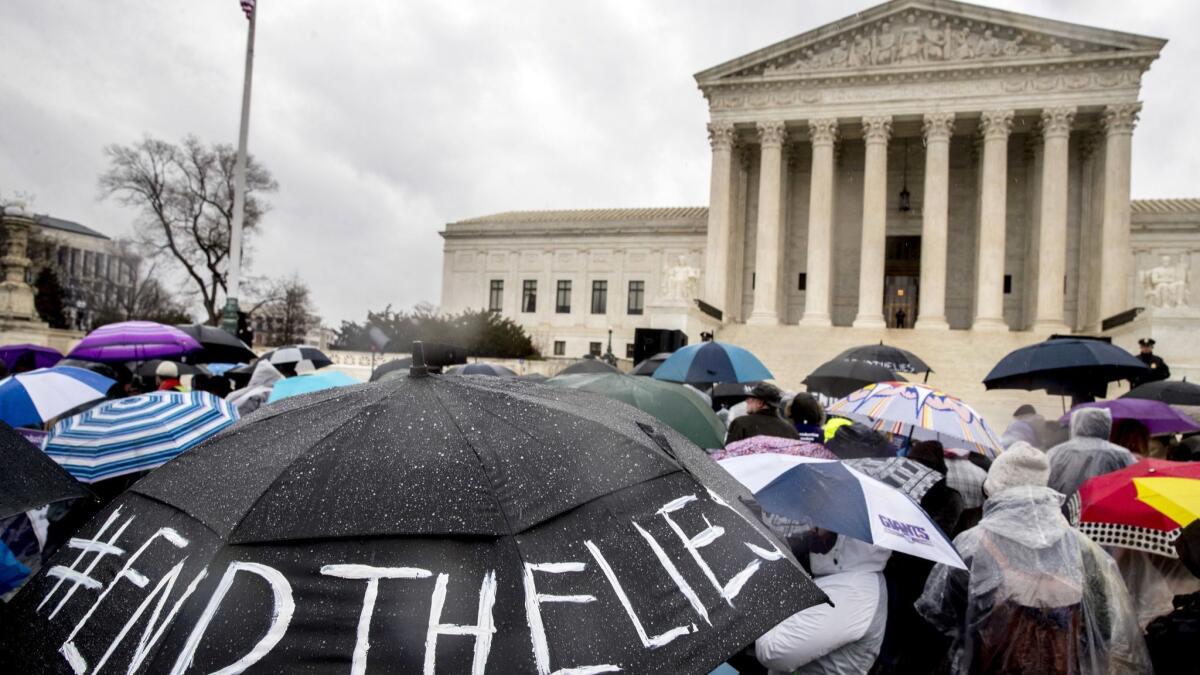Op-Ed: We should all celebrate the Supreme Court ruling on compelled speech, regardless of our views on abortion

- Share via
The U.S. Supreme Court has long been solicitous for our nation’s first liberty, free speech — widely understood to include the choice of what not to say.
On Tuesday, the court reminded us that this principle endures. Its 5-4 decision in National Institute of Family and Life Advocates vs. Becerra stopped the state of California from forcing faith-based pregnancy centers to provide free advertising for abortion clinics. This is a ruling we should all celebrate, regardless of our views on abortion.
I argued this case before the court on behalf of NIFLA. Our lawsuit challenged the so-called Reproductive FACT Act, a 2015 law that required pro-life pregnancy centers to tell women how to obtain an abortion from the state. The law had two facets: Pregnancy centers that are licensed medical facilities were directed to provide a phone number for a county office that refers callers to Planned Parenthood and other abortion providers. Centers that are not licensed medical facilities were forced to state as much in a 29-word disclosure on any advertising materials, in up to 13 languages, effectively drowning out their message in their own advertisements.
Headlines about ‘abortion and free speech’ aside, this case was rooted in 1st Amendment concerns, against a factual backdrop of abortion.
Writing for the majority, Justice Clarence Thomas quoted a 1972 decision by Thurgood Marshall, rightly reminding us that governments have “no power to restrict expression because of its message, its ideas, its subject matter, or its content.” Thomas condemned the requirement to “provide a government-drafted script” as unconstitutional content-based regulation of speech. These centers exist to discourage abortions and support pregnant women in that choice. As Thomas pointed out, the notice requirement “alters the content” of the centers’ speech.
The majority rejected California’s argument that it was simply regulating “professional speech.” Some courts of appeals have made such a distinction, but the court disagreed with the idea that speech would be “unprotected merely because it is uttered by ‘professionals.’” Indeed, the court added, “the people lose when the government is the one deciding which ideas should prevail.”
Also rejected was California’s contention that its law was about ensuring informed consent for patients. Unlike Planned Parenthood vs. Casey, Thomas wrote, the California law blanketed “all interactions between a covered facility and its clients, regardless of whether a medical procedure is ever sought, offered, or performed.”
In other words, California went too far. Its law unconstitutionally targeted these pregnancy centers because of their views opposing abortion. No one should be forced to express a message that violates their convictions, especially on such deeply divisive subjects. The court was right to put a stop to the law.
Enter the Fray: First takes on the news of the minute from L.A. Times Opinion »
The opinion also reflects the skepticism the judges displayed during oral arguments about the requirements placed on unlicensed pregnancy centers. Justice Anthony Kennedy, for instance, asked me whether the lengthy disclosure must be included on a billboard that read, simply, “Choose Life.” When I confirmed the disclosure would be required — in a font larger than or equal to the text of the ad itself — Kennedy opined from the bench, “It seems to me that that means this is an undue burden… that should suffice to invalidate the statute.”
Not surprisingly, that is precisely how the court ruled. Citing the billboard example, the majority held that requiring such a notice “drowns out the facility’s own message” and “‘effectively rules out’ the possibility of having such a billboard in the first place.”
NIFLA vs. Becerra now returns to the lower courts with instructions that these provisions immediately be halted while our legal challenge continues. The proper resolution to the case is clear. The California law should — and by all conceivable accounts, will be — struck down.
“Abortion” may be the word dominating headlines today, but this case was always rooted in 1st Amendment concerns, against a factual backdrop of abortion. It is likely for this reason that the American Civil Liberties Union, an established defender of abortion but an even more established defender of free speech, failed to submit an amicus brief in support of California.
Americans need not agree on every issue, but we should agree that free speech needs to be defended, which is what the court did here.
Michael Farris is president, CEO and general counsel of Alliance Defending Freedom, which represents the National Institute of Family and Life Advocates.
Follow the Opinion section on Twitter @latimesopinionand Facebook
More to Read
A cure for the common opinion
Get thought-provoking perspectives with our weekly newsletter.
You may occasionally receive promotional content from the Los Angeles Times.






